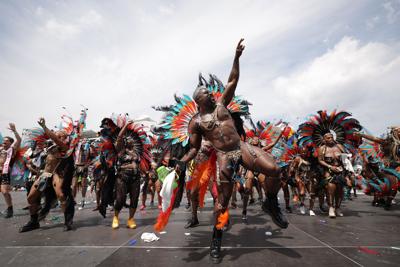Earlier this year, I said that joy was my word for 2024.
The reason I want to add more joy to my life is because so much going on in the world is so heavy. Tomorrow, I’m picking up my Carnival costume and preparing my feet for Saturday’s Grand Parade. This weekend, the Lakeshore will be covered in glitter and feathers for the annual .
I’m going to infuse more joy into my life this Simcoe Day long weekend.
Some folks are heading out of the city to get away from the festivities, but I’m leaning into it. I’m going to dance and jump up with thousands of locals and tourists of all backgrounds and enjoy because that is what Carnival is about. In my younger years, participating in what was then known as Caribana was about seeing and being seen, hearing the latest Soca songs and partying, but as I get older, I realize the need to go back to the roots of Carnival.
Some people think Carnival is simply about getting on bad. Others say it’s rife with violence, but Carnival, like Pride, is a protest.
. It’s not just an opportunity to fling glitter or take over a major artery in the city and cause more traffic chaos. It’s a time to understand our history and ensure that folks remember that we, Black Canadians of the Caribbean diaspora, have added to the fabric of Canadian culture.
I would be happy to just jump and wave and party with the other thousands of revellers, but it’s important to use Sankofa (an African word from the Akan tribe in Ghana which means ‘’) to reflect on our shared history to understand why Carnival is an important piece of Canadian culture.
The first Monday of August is Simcoe Day, named after John Graves Simcoe, who passed on July 9, 1793, which ended the sale of slaves by Canadians to Americans. Unfortunately, many people don’t know about Canada’s history of enslavement in both . The Act Against Slavery freed American slaves entering Upper Canada, but enslaved Africans toiling in Upper Canada had to wait another 40 years for their emancipation.
On Aug. 1, 1834, 190 years ago, the of 1833 ended enslavement in the British Empire, freeing more than 800,000 enslaved Africans in British colonies, including the Caribbean and Canada. While we were freed, we still had to continue to fight for our human rights.
In 1967, for Canada’s 100th birthday, the country’s Caribbean communities came together to offer our culture as a gift to the country they now called home. That was the start of Carnival in Canada.
In March 2021, Canada’s House of Commons voted unanimously to officially designate Aug. 1 Emancipation Day.
Tonight, É«É«À²nians will take the , hosted by the TTC in collaboration with the Blackhurst Cultural Centre, to commemorate Emancipation Day. Folks will ride a TTC train from Union Station to Downsview Station to commemorate the Underground Railroad, the largest anti-slavery movement in North America and celebrate the emancipation of African descended peoples.
This weekend, we celebrate É«É«À² Caribbean Carnival and it’s more than a party. It’s remembering where we came from as a people. We’re celebrating our freedom, heritage, and the enduring spirit of people who, despite centuries of oppression, continue to contribute richly to society.
Carnival, a celebration that has its roots in resistance, is a reminder that while there has been much progress, there is still work to be done to address systemic inequalities and to ensure that the freedoms fought for by our ancestors are realized for every Canadian.
Error! Sorry, there was an error processing your request.
There was a problem with the recaptcha. Please try again.
You may unsubscribe at any time. By signing up, you agree to our and . This site is protected by reCAPTCHA and the Google and apply.
Want more of the latest from us? Sign up for more at our newsletter page.



























To join the conversation set a first and last name in your user profile.
Sign in or register for free to join the Conversation